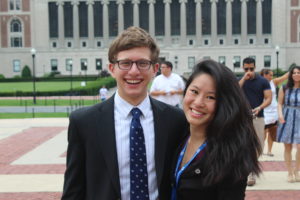It is ironic that the platform we have grown to love, that we use to empower others and discuss inequality and misogyny, has such a widespread problem of lack of female representation. Despite the fact that I have met incredibly strong and passionate women through Model U.N., the fact of the matter remains that I can squarely count using my hands and fingers the number of female delegates in my crisis committees over the last 3 years.

As somebody who is greatly passionate about Model U.N, I feel as if delegates everywhere owe it to themselves to ameliorate the integrity of the sport. As a feminist who also happens to identify as a male, I believe it is imperative to do what little I can to empower the women around me, especially in a male-dominated room. After interacting with women across all committees on a variety of platforms, here are several tips I have acquired to help you help women around you. I realize that this is quite literally the tip of the iceberg and there is still much more to do, but it is imperative to make a start.
- Listen, listen, listen: Model U.N can get quite hectic, but it’s important to be a respectful listener regardless of who is talking. I wish I did not have to emphasize this tip, but too often I see people squarely ignoring speeches given by women. In fact, women have communicated to me that we have had conversations where it felt like they were speaking into a void. It is necessary to constantly consider whether you are being respectful of the women in the room, or whether you are subconsciously defaulting to the lower pitched, often louder voices.
- Be critical!: Perception is everything in Model U.N. Even as a seasoned delegate, sometimes I will make judgments too quickly and perceive a delegate to be something they are not. It should not come as a surprise that in some cases, confident and assertive women will be painted in a negative light and described to be bossy or sassy. We as a community should not be shunning confident women, but instead celebrating them! While we all complain about the power del on occasion, make sure to be extra careful when labeling female delegates.
- Unmod Dynamics: Unmods can certainly be stressful, especially in General Assemblies. Instead of letting the power delegate ramble on, be sure to chime in your position and ideas but also perhaps asking a delegate who is more shy the opportunity to speak up. From my personal experience, a lot of shy but well-researched delegates are women, therefore extending them the chance to shed some insight will not only empower them but also strengthen your bloc by adding in new perspectives and ideas.
- Don’t Assume!: Time and time again, delegates in committee will regard female and male delegates in a completely different manner. Pay attention to what substance the delegate has, such as their research, solutions, etc. Don’t make any preconceived notions about their behavior or personality based off of their appearance. If a female delegate seems to be a powerful contender, recognize that she has some great ideas and that she is as powerful as her male counterparts. Instead of avoiding her, try talking to her and understand her ideas!
I have always been more interested in the topics discussed in Disarmament Committees and Security Councils. Ever since I started choosing them, however, I feel like they are mostly male-dominated committees, whereas environmental, humanitarian and gender equality committees are mostly comprised of women. I think that we need to change that: I do not think this happens because women are mostly interested in the other committees, but maybe because they are intimidated or not encouraged enough to try. So I would suggest that as head delegates and presidents of MUN clubs, we encourage women to join these committees. Having different perspectives and worldviews in a single committee will without only enrich the content of the debate.
Whether you’re a woman who struggled with these issues, or a male delegate who wants to pitch in and reverse the effects of the MUN ecosystem, understand that you made the first step by recognizing the injustices that can occur and that you should be proud of yourself. Model U.N can be very competitive – but your performance should never be based on anything except your skill and knowledge. So the next time you’re in a committee room, take note of the dynamic and speak up for what you think is right; be the change you want to see!


